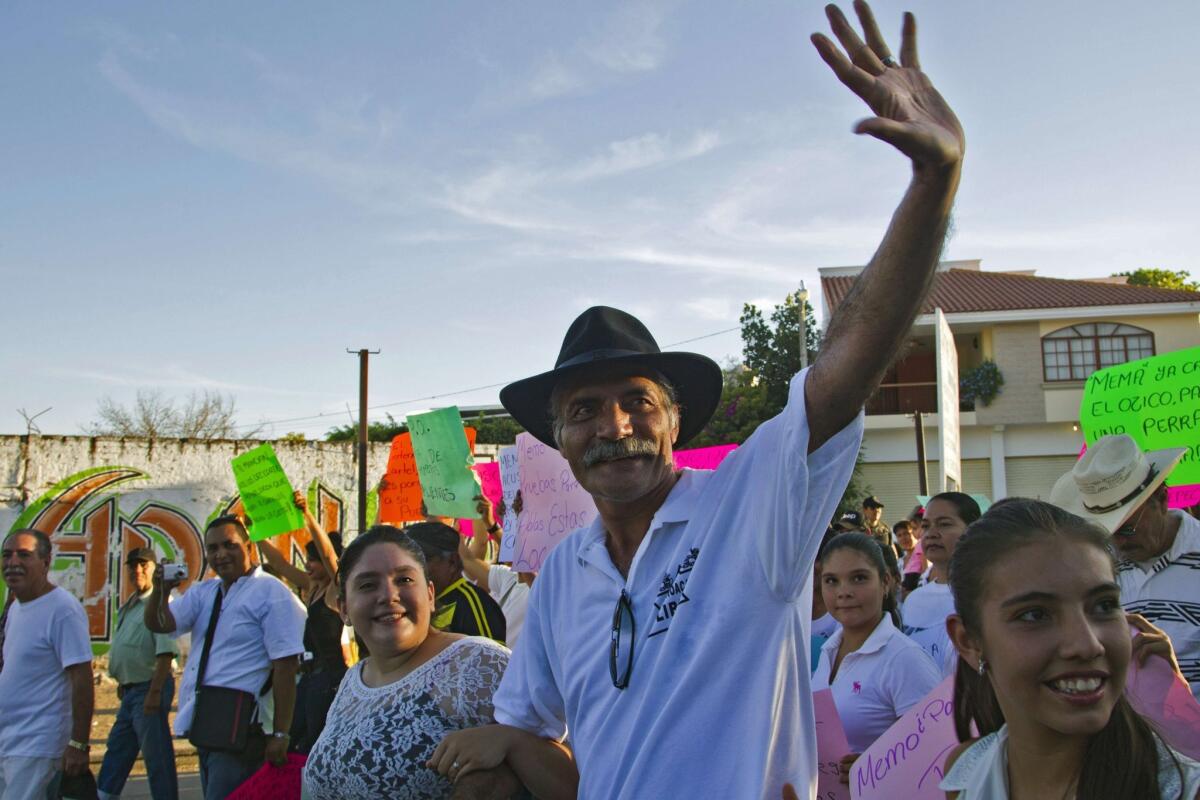Former Mexican interim governor in embattled state ordered questioned

- Share via
MEXICO CITY—The former interim governor of Mexico’s troubled Michoacan state, who has been accused by a vigilante “self-defense” group leader of having drug cartel ties, has been ordered to appear before federal prosecutors for questioning, officials said.
Jose Jesus Reyna Garcia, who served as the appointed governor of the western state from April to October of last year, was ordered to the attorney general’s headquarters in Mexico City on Friday afternoon to give testimony as part of a federal investigation, according to a government statement released late Friday night. The statement did not indicate what the investigation was about, nor did it indicate whether Reyna was considered a suspect.
Reyna, who is the state’s interior minister, has strenuously denied drug cartel links. But his order to appear before prosecutors may add a new layer of complexity to the situation in Michoacan, where an uprising by armed citizen militias against a drug cartel called the Knights Templar has resulted in a tangle of accusations, counter-accusations and suspicions about the motives of key actors.
Reyna served as interim governor between April and October of last year, filling in for the then-ailing governor, Fausto Vallejo. He is a member of President Enrique Pena Nieto’s Institutional Revolutionary Party.
In late July, a prominent self-defense group leader named Jose Manuel Mireles, in a radio interview, accused Reyna of being a Knights Templar member, alleging that Reyna was one of one of a host of corrupt officials who had given the vigilante groups no choice but to rise up and defend themselves.
“In the state of Michoacan, the rule of law does not exist,” Mireles said. “The interim governor is one of the Templars, [and] many of the municipal presidents and municipal police forces in the state, the state police force and the public prosecutors are part of organized crime.”
The state government at the time issued a statement saying it “categorically” rejected the accusations against Reyna.
Questions have also arisen about the motives of the self-defense groups. In January, the Mexican attorney general said that some were receiving arms from a rival cartel, the Jalisco New Generation, raising the possibility some vigilantes have been fighting a proxy turf war on behalf of the New Generation.
That same month, the newspaper Excelsior reported that Mireles had been arrested in 1988 with 189 pounds of marijuana, and had been sentenced on federal drug charges. Last month, two other Michoacan self-defense group leaders were arrested, each suspected of involvement in separate homicide cases.
By January, the self-defense groups had kicked the cartel out of a number of small towns, and were threatening to start a larger battle with the Knights Templars in one of their strongholds, the city of Apatzingan. The federal government sent in thousands of troops and federal police in an effort to keep the peace. The federal forces, in some cases, ended up collaborating with the self-defense groups to root out cartel members.
The collaboration put the Mexican government in a precarious position, given the lingering doubts about the vigilantes’ motives, and their refusal to lay down their arms.
On Thursday, Mexican federal officials said that it was time for the self-defense groups to disarm, arguing that many leaders of the cartel have been killed or arrested in the federal crackdown.
More to Read
Sign up for Essential California
The most important California stories and recommendations in your inbox every morning.
You may occasionally receive promotional content from the Los Angeles Times.










